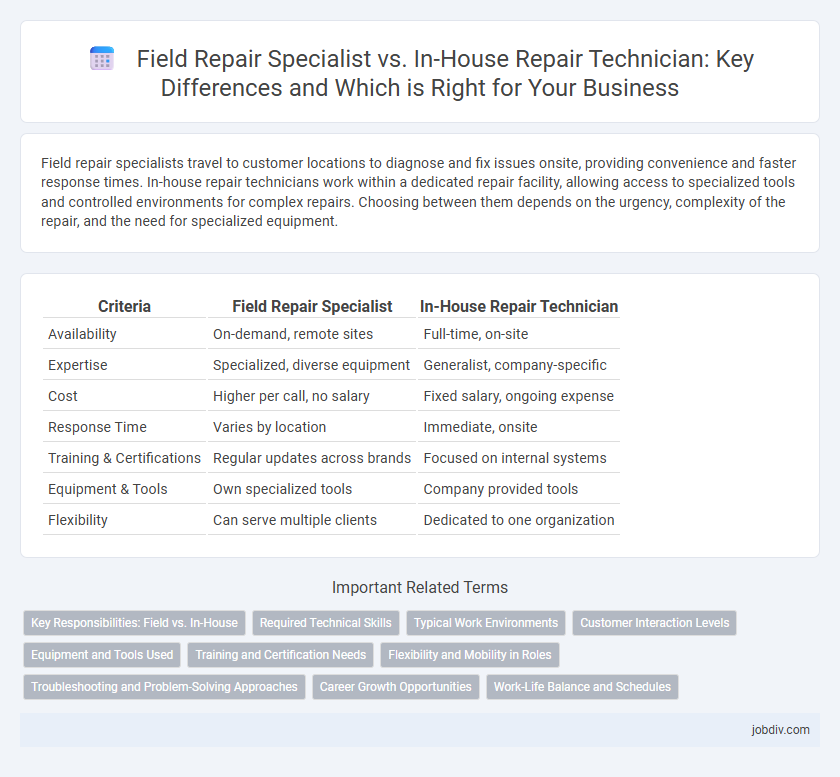Field repair specialists travel to customer locations to diagnose and fix issues onsite, providing convenience and faster response times. In-house repair technicians work within a dedicated repair facility, allowing access to specialized tools and controlled environments for complex repairs. Choosing between them depends on the urgency, complexity of the repair, and the need for specialized equipment.
Table of Comparison
| Criteria | Field Repair Specialist | In-House Repair Technician |
|---|---|---|
| Availability | On-demand, remote sites | Full-time, on-site |
| Expertise | Specialized, diverse equipment | Generalist, company-specific |
| Cost | Higher per call, no salary | Fixed salary, ongoing expense |
| Response Time | Varies by location | Immediate, onsite |
| Training & Certifications | Regular updates across brands | Focused on internal systems |
| Equipment & Tools | Own specialized tools | Company provided tools |
| Flexibility | Can serve multiple clients | Dedicated to one organization |
Key Responsibilities: Field vs. In-House
Field Repair Specialists handle on-site diagnostics, troubleshooting, and immediate repairs, ensuring minimal operational downtime and adapting to diverse environments. In-House Repair Technicians focus on controlled diagnostics, detailed component repairs, and routine maintenance within the facility, leveraging specialized tools and consistent workflows. Comparing key responsibilities highlights Field Specialists' mobility and adaptability versus In-House Technicians' precision and resource access.
Required Technical Skills
Field Repair Specialists require advanced diagnostic abilities, adaptability to diverse equipment, and strong problem-solving skills to address unpredictable issues on-site. In-House Repair Technicians typically possess deep expertise in specific machinery, proficiency in routine maintenance, and familiarity with company protocols and tools. Both roles demand electrical and mechanical knowledge, but field specialists often need superior troubleshooting skills for varied environments.
Typical Work Environments
Field Repair Specialists operate in diverse on-site locations, ranging from industrial plants to outdoor settings, requiring adaptability to varying conditions and immediate problem-solving. In-House Repair Technicians work within a controlled factory or workshop environment, benefiting from access to specialized tools and equipment for detailed diagnostics. The contrasting work environments influence scheduling flexibility, scope of tasks, and types of repairs performed.
Customer Interaction Levels
Field Repair Specialists engage directly with customers on-site, providing personalized diagnostic and repair services that enhance trust and satisfaction. In-House Repair Technicians operate within the company's facilities, where customer interaction is limited primarily to remote communication or scheduled drop-offs, resulting in less immediate customer engagement. Higher levels of face-to-face interaction by Field Repair Specialists often lead to improved customer feedback and loyalty.
Equipment and Tools Used
Field Repair Specialists utilize portable diagnostic tools, specialized handheld devices, and wireless communication equipment to efficiently troubleshoot and repair machinery on-site. In-House Repair Technicians typically have access to a comprehensive range of stationary tools, advanced diagnostic software, and dedicated repair bays equipped with heavy-duty machinery and calibration instruments. The choice of equipment directly impacts repair speed, accuracy, and the ability to handle complex mechanical or electronic system issues.
Training and Certification Needs
Field repair specialists require extensive training in diverse environments and must obtain certifications relevant to on-site equipment and safety protocols, ensuring adaptability and compliance in varying conditions. In-house repair technicians typically focus on specific machinery with certifications centered around factory standards and controlled environments, allowing for specialized technical expertise. Both roles demand continuous education to stay updated with evolving technologies and industry standards to maintain repair quality and efficiency.
Flexibility and Mobility in Roles
Field Repair Specialists offer unmatched flexibility and mobility by providing on-site services across diverse locations, reducing equipment downtime and travel costs. In-House Repair Technicians deliver consistent, centralized expertise but lack the dynamic response capabilities that mobile specialists provide. Businesses prioritizing rapid, location-independent repairs often benefit more from the adaptable deployment of Field Repair Specialists.
Troubleshooting and Problem-Solving Approaches
Field Repair Specialists excel in troubleshooting by adapting swiftly to diverse environments and leveraging on-site diagnostic tools for immediate problem resolution. In-house Repair Technicians utilize in-depth system knowledge and access to specialized equipment within a controlled setting to conduct thorough analysis and complex repairs. Both approaches emphasize systematic problem-solving, but field specialists prioritize rapid adaptability while in-house technicians focus on detailed, resource-intensive diagnostics.
Career Growth Opportunities
Field Repair Specialists benefit from diverse, hands-on experience across multiple environments, accelerating skill development and adaptability in troubleshooting various equipment. In-House Repair Technicians often experience steady career growth through specialization in specific systems and internal advancement within a single organization. Both roles offer distinct paths; field specialists gain breadth and exposure, while in-house technicians build deep technical expertise and upward mobility in corporate settings.
Work-Life Balance and Schedules
Field Repair Specialists often face irregular hours and extended travel, leading to challenges in maintaining a consistent work-life balance, whereas In-House Repair Technicians typically benefit from fixed shifts and a stable daily schedule. The predictability of in-house roles allows for better personal time management and reduced stress, contributing to overall well-being. Employers seeking to improve employee satisfaction should consider these schedule differences when defining repair responsibilities.
Field Repair Specialist vs In-House Repair Technician Infographic

 jobdiv.com
jobdiv.com